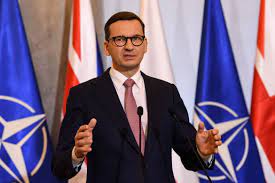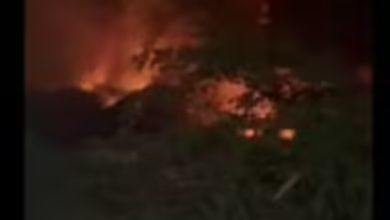Poland and Ukraine argue about grain trade, and relations are at their lowest point since the beginning of the Russian invasion
The close ties between Kyiv and Warsaw have deteriorated to their lowest point since Russia’s invasion of Ukraine last year due to a disagreement over whether Ukrainian grain should be let to enter the domestic markets of Poland and other European Union nations.

Polish officials have vowed to extend a ban on food supplies from the war-torn nation and likened Ukraine to a drowning person harming his assistance. While this is going on, Ukrainian President Volodymyr Zelenskyy said that Russia is being aided by EU partners who are forbidding the entry of grain from his country.
Poland, which is on NATO’s eastern flank, has been a steadfast ally of Ukraine, providing it supplies of arms and help as well as opening its borders to displaced people.
Polish authorities are now voicing their displeasure over some of Ukraine’s most recent actions, including a World Trade Organization complaint over prohibitions on Ukrainian grain from Poland and two other EU nations. Polish officials are seeking to win the parliamentary elections next month with the support of farmer votes.
Alarmingly, some people in Europe transform grain into a thriller by acting out solidarity in a political setting. They could seem to be playing themselves. In reality, Zelenskyy stated during the UN General Assembly on Tuesday, “they’re setting the scene for a Moscow actor.
Zelenskyy’s remarks to Ukrainian Ambassador Vasyl Zvarych drew “strong protest” from Pawel Jablonski, Poland’s deputy foreign minister, on Wednesday.
As far as Poland is concerned, Jablonski “indicated that it is untrue, and that the opinion is unjustified toward the country that has been supporting Ukraine from the very first days of the war,” the Polish Foreign Ministry said in a statement.
Law and Justice, the governing party in Poland, is vying for the support of farmers, many of whom are angry that Ukrainian food imports have swamped the local market, driving down prices and jeopardizing their livelihoods.
After the EU recently voted to abolish such limitations, several Ukrainian agricultural products were prohibited in Poland, Hungary, Slovakia, and Croatia. When Kyiv declared that it would responding with a WTO lawsuit on Tuesday, Croatia entered the fray.
But we have the right to fight ourselves against damage being done to us, Polish President Andrzej Duda told reporters in New York on Tuesday while addressing the U.N. General Assembly. “Ukraine is behaving like a drowning person clinging to everything he can…but we have the right to defend ourselves against harm being done to us,” he said.
The escalating hostilities illustrate the dangers Ukraine faces in retaining Western backing as its conflict with Russia continues.
Poland would not likely limit its military support for Ukraine since its success is so crucial to Poland. Poland, which once suffered under Moscow’s tyranny, does not want to see Russia triumph in a conflict with a neighboring nation.
However, a new far-right alliance, Confederation, whichs leaders say that the nation is doing too much to aid Ukraine and that Ukraine isn’t thankful enough, is challenging the governing party in elections.
The conflict also demonstrates how Ukraine and its neighbors are rival agricultural powers and how European support for local farmers may make Kyiv’s dreams for a future road into the EU more difficult.
Since Russia’s invasion, Ukraine, a key provider of wheat, barley, maize, and vegetable oil, has had difficulty getting its food goods to areas of the globe where there is a famine crisis. All of the EU nations will continue to let Ukrainian goods to pass through their borders and into global markets.
By leaving a wartime pact that guaranteed safe passage for Ukrainian grain over the Black Sea, Russia struck a severe blow in July. As a result, Ukraine now primarily exports its goods via more costly channels through Europe to underdeveloped countries where food costs have increased as a result of Russia’s conflict.
However, this week saw the departure of the first ship carrying grain from a Ukrainian port through a temporary Black Sea route.
This week, Ukraine also threatened to outlaw various Polish foods, although it later seemed to back down. Polish prohibitions will only increase as a result, according to Prime Minister Mateusz Morawiecki.
Morawiecki stated on Polsat News on Wednesday, “I am warning the Ukrainian authorities, because if they escalate the conflict in this way, we will add more products to the import ban into Poland.”
He said that Ukrainian authorities don’t seem to comprehend how the fighting has disrupted Poland’s agriculture business.
The pro-Russian Socialist party in Bulgaria has proposed a bill to the legislature that would ban food from Ukraine. Up until now, the administration has just suspended the import of sunflower seeds while it negotiates a quota with Kyiv.
After extensive discussions with farmers who began a statewide protest last week against parliament’s decision to relax a ban on Ukrainian imports, citing increasing food costs, Prime Minister Nikolai Denkov announced the plan late on Tuesday.







